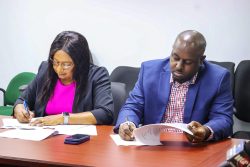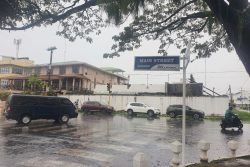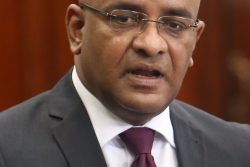Dear Editor,
The Constitution Reform Commission bill, passed by Parliament on 15 November 2022 is the most momentous piece of legislation passed in a long time, given its far-reaching implications for the future stability and development of this country. It is imperative that every citizen in this country must wake up to the enormous importance and relevance of this legislation to their future wellbeing.
Granted, constitutional reform is nothing new to Guyana. However, this Commission comes at a critical juncture for Guyana. The new-found oil resources put Guyana in a position where we have the choice between improving the wealth and wellbeing of its citizens and preserving our environment, on the one hand, and descent into further discord and chaos, on the other. What we do about this Commission will determine critically the choice we make for our future. Every citizen has a duty to wake up to this reality. There is no point in watching this opportunity go by and then complaining afterwards.
Everyone should familiarize themselves with this legislation in order to form an opinion on it and how to respond. Just to mention some highlights: the Commission shall consist of 20 members including 5 PPP/C, 4 APNU/AFC, and one representative each from the Liberty and Justice Party/ANUG/The New Movement, the Bar Association, the labour movement, the National Toshaos Council, the private sector, women’s organizations, youth organizations, Christian organizations, Muslim organizations, the Hindu organizations and farmers. The heavy hand of the Government is evident as the President shall appoint the Chairperson and all the members.
In terms of the areas that the Commission is charged to deal with, the legislation outlines the widest gamut of subject matters, from fundamental rights, rights of the child and indigenous people, and eliminating discrimination to election reform, judiciary independence and the functioning of the National Assembly and Local Government system.
One thing that is missing from the legislation is that it does not say, even in a general preamble, what it is hoped the Commission will achieve. Maybe this is taken for granted, but I think it is an essential charge to the Commission and the public as a way to judge its success or failure.
I would also stress that a strong, central role of civil society organizations is the only hope, repeat, the only hope of achieving genuine reform. Civil society organizations must come together independently and hammer out a well-conceived, well-articulated position for the consideration of the Commission. It is evident from their position on GECOM reform and other indications that the PPP/C has no appetite for fundamental constitutional change. As for the APNU/AFC, we don’t know their position since they walked out of the Parliamentary debate on the bill and have not articulated a clear position. However, there is nothing to indicate that their commitment to reform is any stronger than that of the PPP/C. It remains for Civil Society organisations to come together and identify and push for the changes that will address the wishes of the population for harmony, justice and competent, effective governance.
As ERG Coordinator, I remain convinced that electoral reform is a priority for Constitution reform. The areas mentioned in the legislation are all important, but this Commission must focus on those areas that will strengthen our weak elections and governance systems, and promote accountability, inclusiveness and representativeness. Fixing these things will make it easier to move on to an ongoing agenda of national improvements.
My final reflection at this time is that although this Commission matters to us all, the youth of our country have the biggest stake in it. Young people must pay attention and get involved in the deliberations of this commission. In particular, the students of the University of Guyana as future leaders and managers of this country, must study the legislation and educate themselves on the relevant aspects of how this country is run and make their voices heard in a knowledgeable way in order to influence proceedings positively. Indeed all tertiary and secondary education students must make it their business to inform themselves and discuss the proceedings of this commission.
Yours faithfully,
Desmond Thomas





